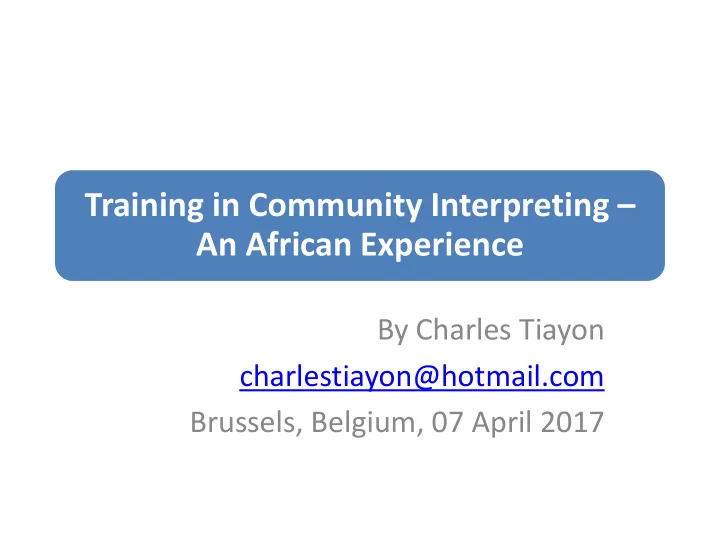

Training in Community Interpreting – An African Experience By Charles Tiayon charlestiayon@hotmail.com Brussels, Belgium, 07 April 2017
Introductory Remarks • A follow-up to the paper published in 2005 on “Community Interpreting - An African Perspective” • Questions: – What are developments since then, at least in matters of practice and training? – Are developments conclusive or inconclusive? • Focus: ASTI, University of Buea, Cameroon
Towards a Definition of Community Interpreting 1 • Traditionally, community interpreting or PSI is simply defined as interpreting to ensure communication between a public service (hospital, court, police, etc.) and people who do not master the mainstream language • Here, ‘community interpreting' is interpreting to facilitate mutual understanding between speakers of the mainstream language (usually the official language) and those with limited proficiency in this language. • Community practice is therefore carried out, as matter of right, from and “into minority languages in order to ensure communication with all citizens and residents of a country and empower minority language users by giving them access to information and enabling them to participate in society ” (my emphasis)
Towards a Definition of Community Interpreting 2 Preferred descriptors: – community+social communication vs public service, – “language vs setting” (minority vs majority language, official vs non-official language community); – both local and migrant communities, – a “human right” rather than a favour – overall focus on community wellbeing, effective social communication and individual empowerment)
Community Practice as a Relatively Old Practice but New Discipline • an everyday practice across Africa (inc. courts, hospitals, police, community radios and TVs, churches, civil status registries, movies, etc.) without prior training, and often associated with some amount of “community translation” • offered as an elective course of 2-4 hours a week in mainstream ASTI MA programmes since the 2007-2008 academic year • reinforced as an elective course since 2013-2014 with the inception of PAUTRAIN MA programmes
Some Challenges of Training in Community interpreting • the tendency to view community interpreting with contempt; at best, as a lower type of practice/subject; at worst as nonexistent or useless • an often wide variety of trainee languages in each class, with an average of 6-8 students and 4-6 different languages per year • a questionable mastery of language by interested trainees • scarcity/lack of reference material and unavailability of resource persons
Approach to Community interpreting Teaching/Learning • Community interpreting exclusively as an elective course to small groups of students who were initially admitted to study in the School’s major language combinations • Trainees must have a reasonable mastery of speaking (and writing) in their chosen language • Trainees must all have at least one of the teacher’s languages in common; method/process-centred rather than single-language focussed, student-centred and self-discovery approach to interpreting learning, with teacher simply used for scaffolding purposes • Peer assessment encouraged, especially so where two or more students share the same language • External examiner assessment in collaboration with course tutor • Training through MA student research supervision
Prospects of training in community interpreting • with each of 2500 African languages in mind and a shift from language diversity as a disadvantage to language diversity as cultural wealth, community interpreting is a real investment opportunity both for trainees and training institutions • encouraging both monolanguage and multilanguage groups of trainees • offering community interpreting as an elective course in programmes which focus exclusively on combinations of majority/dominant languages at master’s level • offering community interpreting too as a fully-fledged certificate programme to already-trained professional interpreters or qualified linguists with requisite knowledge in the relevant minority endogenous African languages
Concluding Remarks: Advantages of Training in Community interpreting • a major support to quality communication and inclusive (interpreter) education in both endogenous and exogenous languages in Africa (including interpreting from/into sign language and Braille) • multilanguage (vs monolanguage) contributions of the community interpreting class are unique opportunities to explore novel ways for observing interpreting as a process over and beyond specific languages • contribution to quality intercultural communication between users of exogenous languages and those of endogenous languages of Africa
Select Bibliography (Reverse Chronological Order) • Pedregosa, Inma 2017. A Review of Taibi, Mustapha and Ozolins, Uldis 2016. Community Translation . London, New York: Bloomsbury Academic, Bloomsbury Advances in interpreting Series. In Specialised Translation , Issue 27 • Taibi, Mustapha and Ozolins, Uldis 2016. Community Translation . London, New York: Bloomsbury Academic, Bloomsbury Advances in interpreting Series • Tiayon, Charles 2005. Community Interpreting: An African Perspective. In Hermeneus, Revista de Traducción e Interpretación . No. 7 • Tiayon, Charles 2009. A Case for Community Translational Communication from / into African Languages: Some Macro-Level Organisational and Management Concerns. In Chia, Emmanuel, Joseph C, Suh and Alexandre Ndeffo Tene (Eds) Perspectives on Translation and Interpretation in Cameroon , Bamenda: African Books Collective • Tiayon, Charles 1990. Exploration in the Organisation and Management of Tramslational Communication. Unpublished Master’s Dissertation, ELR: University of Birmingham
Jërëjëf ! Asante! Thank you! Merci ! Obrigado! !Gracias!
Recommend
More recommend